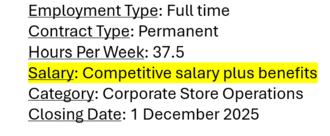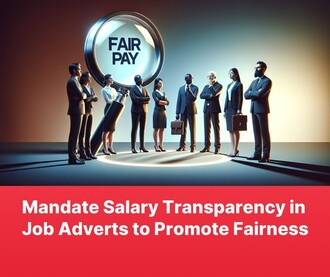-
Stop hiding salaries: Make showing pay in job ads compulsoryThousands of jobseekers are wasting huge amounts of time, energy, and emotional investment applying for jobs, only to find out at the interview stage that the salary does not meet their needs. Phrases like "Competitive Salary" are misleading and hide the true seniority of a role. Transparency stops the unfair practice of low-balling candidates based on their "salary expectations" rather than the value of the job. It saves time for both the recruiter and the applicant. In 2024, I was made redundant after working for a large financial institution for 25 years in mid-senior roles. So far I have been unsuccessful at finding a new job, despite my experience and qualifications. For most applications, I am asked about my salary history or expectations. Even when I explicitly state I am happy to accept significantly less, sometimes £20-25k less I can tell employers are afraid I will 'walk' as soon as a better offer comes along. In several cases, I wouldn't have applied for a role at all had I known the pay wouldn't meet my financial needs. Listing the salary upfront would have saved everyone's time For example, one role required three days in the office. Because I have mobility issues and don't drive, the commute would have cost me £260 a month in taxis, but the employer was unwilling to negotiate on this. It was heartbreaking to receive a rejection email after investing so much time preparing, researching, and tailoring my CV for a job that was financially unviable from the start.4 of 100 SignaturesCreated by Diana Oakes
-
Stop the Cycle – Protect Passengers, Workers and Taxpayers.When private investors take over struggling companies, they often promise rescue — but when those companies fail, it’s ordinary people who pay. Greybull Capital owned Monarch Airlines, British Steel and Comet. Each collapsed, costing thousands of jobs and tens of millions in taxpayer money. Monarch’s fall alone forced the Government to spend £40 million flying stranded passengers home. It’s wrong that the same investors can then make a profit from failures and donate to political parties while their companies declare “no one in control”. The system rewards secrecy and punishes honesty. Passengers, workers and taxpayers deserve stronger protections, not another bailout for corporate speculators.34 of 100 SignaturesCreated by Tom Deacon
-
To make plymouth amazon drivers start to work earlierTo make amazon's DSP drivers have a familiar and social life as they come late at home.5 of 100 SignaturesCreated by Myself Myself
-
Save 3000 Sainsbury's staff from redundancyIt is important to keep staff and not make them unemployed. Many staff have been told in order to steem line business operations they will be making many staff redundant. This is not only due to Sainsbury's closing of cafes, but some other counters, the reduction of checkouts and the increase of self service tills. It is also having a large effect on many of the Argos staff. There are many staff members that have worked for the company for over 10 years that are good at what they do. Only to be told making room to train new people. All staff are an asset to the company so it sadness me to think my colleagues and I will be unemployed.2 of 100 SignaturesCreated by Carol Beadle

-
Raise the rate of Statutory Sick PayStatutory Sick Pay is the legal minimum employers must pay workers who need time off to recover from illness or injury. At just £116.75 per week, or £3 an hour, it simply isn’t affordable for millions of workers across the UK. Sick Pay is supposed to be a lifeline. But imagine if you or your loved one, recovering from illnesses like cancer, chronic fatigue or depression, were forced to go into work when sick or risk falling behind on bills. That's the reality for many people. One in four employees across the UK rely on Statutory Sick Pay when ill. And Citizens Advice estimate that 78% of people on the lowest incomes would go into debt after only a short time off sick. We have an urgent opportunity to change this. The Employment Rights Bill is currently making its way through Parliament. This is our best opportunity this generation to get support for a rise in the rate of Sick Pay. Do you agree that sick pay should be enough to at least cover the bills? Please sign the petition and show your support for #SafeSickPay!2 of 100 SignaturesCreated by Sylvie Pope
-
Mandate Salary Transparency in Job Adverts to Promote FairnessIn the United Kingdom, the lack of salary transparency in job adverts perpetuates inequality and disadvantages certain groups, including women, LGBTQIA+ individuals, ethnic minorities, and people with disabilities. This opaque practice contributes to systemic barriers in the workplace, enabling pay discrimination and reducing opportunities for equitable employment. The Issue Hidden salaries are more than just an inconvenience; they actively perpetuate inequality: For Women: Women in the UK continue to face a gender pay gap of 13.1% (as of April 2024). Lack of transparency exacerbates this issue by making it harder for women to negotiate fair salaries, particularly in male-dominated industries. Research shows women are less likely to apply for roles when salary information is absent, fearing they may be offered less than their worth. For LGBTQIA+ Individuals: Members of the LGBTQIA+ community are already at a disadvantage, often facing workplace discrimination. Hidden salaries make it easier for employers to offer unequal pay, relying on stereotypes or biases about perceived “value” rather than qualifications. For Ethnic Minorities: Ethnic minorities in the UK face persistent pay disparities, with Black and South Asian workers earning significantly less on average than their white counterparts. Without transparency, there is no accountability for these disparities, and workers may unknowingly accept lower pay due to systemic discrimination. For People with Disabilities: Disabled workers experience a disability pay gap of 17.2% in the UK (as of November 2024). Many disabled individuals feel compelled to accept roles without salary clarity, fearing their disability may affect pay negotiations or job offers. The Problem with “Competitive Salary” Phrases like "competitive salary" in job adverts are vague, unhelpful, and allow for significant disparities in pay. This lack of clarity disadvantages candidates in several ways: It Masks Pay Inequities: Employers can exploit the ambiguity of "competitive salary" to offer less to candidates based on gender, race, or other biases. It Discourages Applications: Many candidates, particularly those from under-represented groups, may avoid applying to roles where compensation is unclear, fearing they won’t be paid fairly. It Wastes Time: Job seekers and employers both lose valuable time when salary expectations don't align. We demand that employers be required to disclose a definitive salary or, if not possible, a salary range that is narrow enough to provide meaningful information to candidates (e.g., £30,000–£35,000). Broad, vague ranges (e.g., £25,000–£50,000) are insufficient and undermine the purpose of transparency. The Need for Transparency in a Cost-of-Living Crisis With the country currently experiencing a cost-of-living crisis, where prices for everyday essentials are rising on a near-monthly basis, it has never been more important to have clear, upfront salary information. Inflation and Rising Costs: As energy bills, food prices, and rent continue to increase, many workers are finding it harder to make ends meet. Salary transparency would allow job seekers to quickly assess whether a role meets their financial needs before committing to time-consuming applications or interviews. Financial Planning: Clear salary information gives workers the ability to plan their finances better, making it easier for them to navigate economic uncertainty. Equity and Fairness: In these challenging times, it is crucial that everyone, regardless of gender, race, ability, or sexual orientation, has the opportunity to earn a fair and equitable wage. Lack of transparency in salary only further perpetuates the struggles faced by many groups already disadvantaged in the workforce. The Solution Salary transparency in job adverts is a proven strategy to tackle these disparities. By mandating that all employers disclose salary ranges or fixed salaries in job adverts, we can: Ensure Accountability: Employers will need to justify pay decisions based on qualifications, not bias. Empower Marginalised Groups: Workers from under-represented communities will have the confidence to demand fair pay. Close Pay Gaps: Transparency forces organisations to address and rectify unjust disparities. Countries like Canada and certain U.S. states have implemented similar policies with positive outcomes, showing that transparency is both achievable and beneficial.3 of 100 SignaturesCreated by Paul Joseph
-
Raise the minimum wage and keep it in line with inflationFor too long the minimum wage has not kept in line with inflation. Our rents, utility bills and cost of food have soared while minimum wages have not risen enough to compensate. This has meant that many people (especially young people) are forced to work long hours while struggling to pay thier rent and utility bills. Please urge the government to raise the minimum wage so that people on low incomes can afford to live without having to work ridiculously long hours.3 of 100 SignaturesCreated by James Hunt
-
Pay a real Living Wage for care workers facing poverty in England“We all have a connection to care work. Even if you can't immediately think of someone who draws on support or who is a paid care worker, every time you leave your house you are likely to be passed by care workers like me driving from visit to visit. I guarantee you have neighbours who are visited by carers and that there are care homes in your community. To ensure support is available when we need it, it is essential that we are at the very least paid enough to cover the essential costs of living. Currently, vast numbers of care workers are illegally paid below the National Minimum Wage as a result of unpaid travel time. Meanwhile, our income is often insecure, with zero-hours contracts the norm. This makes it practically impossible to plan and prompts many to accept any and all of the hours they are offered, causing burnout and poor quality of care. These terms of employment add untold pressure to a role which already carries a significant level of responsibility. Is it any wonder social care faces an acute recruitment and retention crisis? Paying at least a real Living Wage for care workers which takes into account time spent travelling between visits is an essential place to start in addressing the joint crises of care quality and availability in England. It has already been done in Scotland and Wales, now - a full four years on from the nation's clap for carers - it's time to do the same in England. This country depends on care workers, and the quality and availability of support depends on the UK Government taking action. Every care worker's dignity should be protected through payment of at least the real Living Wage.” Rachel Kelso, care worker and Citizens UK community leader1,691 of 2,000 SignaturesCreated by Nichola Jones
-
Help exploited Amazon workers this Black FridayThis Black Friday we need to show Amazon that we are on the side of the exploited and underpaid warehouse workers. The best way to do show this is to refuse to buy anything from Amazon this Friday. When the Amazon accountants see the drop in sales this Friday they will realise that their customers have real power to affect their bottom line. This will worry them. Will they feel more inclined to listen to their workers' demands?53 of 100 SignaturesCreated by Diana Basterfield
-
Living wage riseThe cost of living is effecting many people and industries therefore we need a higher wage for employees4 of 100 SignaturesCreated by Tamara Thompson
-
Introduce a Railcard for Social Care WorkersSocial Care Workers do one of the most difficult and challenging jobs in our society and I believe that introducing this Railcard would not only encourage others to join this demanding but rewarding career, it would also go a long way in acknowledging these workers and showing appreciation for their role.23 of 100 SignaturesCreated by Teresa Hackett
-
DFS Big Summer Sale On Workers PayMany of these workers have given years if not decades of loyalty to the company. By depriving individuals of their full-time hours, DFS is jeopardising their ability to pay their bills and provide for their families. The cuts only affect factory workers. Office staff and management still have their full-time hours and are not being affected. By treating workers like this they are forcing hard workers and skilled workers out of the business, thus lowering the standards of production. These cuts are having a negative effect on the mental health of people who are struggling to make ends meet. We urge CEO Tim Stacey to talk with the workers' union, GMB to pay the workers at least minimum wage for the time they are not being permitted to work.175 of 200 SignaturesCreated by GMB Union North East, Yorkshire and Humber Region
Hello! We use cookies to improve your experience by providing insights into how the site is being used. Find out more.







.png)
